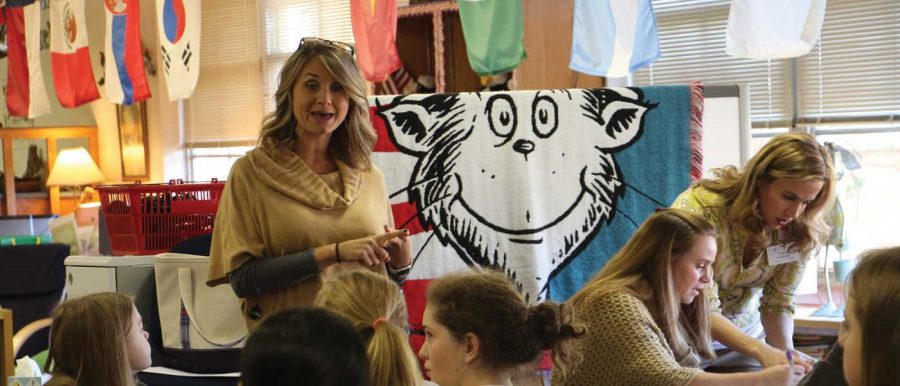There’s no denying that America has a literacy problem. According to the National Assessment of Educational Progress, only one-fourth of fourth graders in the United States can read proficiently. The Day of Service on Nov. 12 addressed this issue by helping to bring children at public schools in the DISD area up to the reading level. The Day of Service, a day on which Hockaday students devote time usually spent in class to improving the community, began two years ago as a part of the Centennial Campaign.
Although it was initially intended to be a one-time event, it received so much positive feedback that the school decided to bring it back two years in a row.
The first Day of Service had no single theme; collaborating organizations were picked at random. Director of Service Learning
Laura Day shifted the focus onto the issue of illiteracy in Dallas in the last year.
“I see [illiteracy] as the biggest issue our city faces,” Day said. “I feel like we can make a real dent in that.”
Senior and Community Service Board Chair Allie Charlton helped organize the Day of Service events. Charlton, who spends time tutoring children at the Sudie L. Williams Elementary School, believes that illiteracy is the root of many loopholes in elementary education.
“[My friend and I] were tutoring first grade boys and they couldn’t read. They were illiterate. We were trying to read the word ‘hat’ and they just weren’t getting it at all. It strikes you that if you’re in first grade and you don’t know the basics, your teacher might just assume that you know how to read and that’s such a huge gap,” Charlton said. “You won’t be able to catch up.”
For this year’s Day of Service, sophomores and seniors traveled off-campus and divided books in public school libraries by reading difficulty, which has proven to help literacy rates for children. Sorting books according to reading level helps children access age-appropriate books.
“If the library is just the Dewey Decimal System and you’re a kid who can’t read, and you go pick out a book, you can get discouraged because you can’t read it. If you go in and level libraries so you know the trajectory, it’s statistically proven that is going to help those kids catch up to grade level reading,” Day said.
Tom C. Gooch Elementary School was one of the public elementary schools that Hockaday girls visited on the Day of Service. Hockaday students frequently volunteer at Gooch to tutor during weekdays and on Saturdays.
Martha Bujanda is the principal of Gooch Elementary School and gave one of the speeches that kicked off the Day of Service.
“[The Day of Service was] incredibly helpful,” Bujanda said. “Leveling libraries is a crucial component in helping us to ensure that all our kids are reading on or above grade level.”
While the seniors and sophomores ventured off-campus, freshmen and juniors stayed behind and rotated between activities that included making book bins for children to store their books in. The book bin project was headed by Reading Partners, a nationwide children’s literacy nonprofit. Book bins not only create a space for kids to put their books, but encourage students to read more through a Take Home Library system implemented by Reading Partners. Through the system, each student receives a book and is allowed to take that book home. Students are asked to write a book report on that book, and once a student turns in 10 book reports, they receive a book bin.
Jackie Walker, the Community Engagement Associate at the Reading Partners Organization, advocates for the importance of book bins.
“Encouraging [a] love of reading is essential for seeing our students’ succeed, and these book bins play a large part in cultivating this passion,” Walker said.
Walker believes that the Day of Service was not only impactful for the elementary schools – it also helped to give the Hockaday community a broader understanding of literacy and its importance.
“Literacy…is about our everyday life. We use our reading skills to navigate so many aspects of our daily routines,” Walker said. “The Day of Service’s focus on literacy both highlights the challenges that so many students face while also making a difference for these young people.”
Those who receive a Hockaday education are privileged enough to learn how to read on or above grade level in elementary school, but this is not the case for many students. A 2013 report by The Annie E. Casey Foundation revealed that nearly 65 percent of third-graders lack the cognitive skills and knowledge necessary to succeed academically nationwide.
This information becomes more startling upon learning that studies have proven there are direct links between third grade reading efficiency and high school dropout rates. A 2012 study by the City University of New York says that a third grader who reads below grade level is four times less likely to graduate high school on time than a classmate who reads on or above grade level. The odds are even worse for low-income students, who are 13 times less likely to graduate by age 19 if they are behind by the third grade.
“Hockaday girls have so much talent to offer, and we’re using that talent to drive our students’ academic gains,” Bujanda said.
Although leveling libraries and constructing book bins are only two steps in the long process of improving literacy at elementary schools, Day “can only imagine that [it] has really helped those schools.”
Walker agrees that Hockaday’s work has had an impact on the community, and added that “the work that the students at Hockaday… are doing is truly making a difference.”
“We are incredibly appreciative to Hockaday,” Bujanda said. “And to all the Hockaday girls who have devoted time and energy to ensure that our kids are getting a fair shot at life.”














